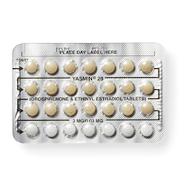Life sucks. Or is it just my birth control?
With all the stresses in life, it can be hard to know what is bringing you down. Let's take a look at what we know about birth control and depression.

With all the stresses in life, it can be hard to know what is bringing you down. Is it the upcoming test that’s stressing you out? Is it the fight you had with your friend? Is it your co-worker being rude for no apparent reason? Or is it your birth control? Let’s take a look at what we know.
FACT: Depression is common.
Depression is a serious health problem that is often overlooked. About one in five people living in the United States will experience clinical depression at some point in their lives and depression is the leading cause of missed school or work in people between ages 15 and 44. Although both men and women can become depressed, women are more likely than men to experience depression.
It’s true that we all feel sad once in awhile, but for most people, these feelings pass in a few days. If you have a depressive disorder, you might not want or be able to do your regular activities like hanging out with friends, going to work, or going to school. For women who started using hormonal birth control around the same time they started feeling low, it can be tempting to blame the birth control for their depression.
Is it the birth control?
When the pill first came out in the 1960s, there was concern that it could be causing depression. But today’s pills contain 8-10 times less hormones (estrogen and progestin). Other methods, such as the ring and IUD, have even lower doses of hormones. Studies of women using our modern combined hormonal birth control methods have shown that they experience a variety of moods. For some women, birth control improved mood and depression.
A Danish study made headlines for showing a connection between hormonal birth control and prescriptions for antidepressants, though the results were complicated to interpret. Other studies have also shown that women taking combined hormonal contraceptives have less variability in their mood than women using non-hormonal birth control.
There have also been studies of progestin-only birth control, such as the shot (Depo), the implant, and hormonal IUDs. There was no difference in likelihood of depression between women using the shot and women using non-hormonal birth control. Even after a year of Depo use, the studies found no change in depression.
The bottom line is that there has been no consistent evidence that the birth control causes depression in most women, but there may still be some unanswered questions. Looking at a woman’s mental health when she starts using birth control is probably the best way to predict how she’ll feel, with or without birth control.
FACT: You know your body (and mood) the best.
Whatever the research says, at the end of the day, you’re the only one who truly knows how you feel. Everyone reacts to birth control differently, so remember that while birth control does not, for most women, cause or worsen depression, some people may have mood changes on birth control. If you’re worried your birth control is making you feel bad, talk with your health care provider about other options. Remember, there are a lot of birth control methods out there—you can find the right one for you!
If you are concerned that you might be depressed, here are some great resources to learn more and find help near you.
How do you feel about this article?

Heat up your weekends with our best sex tips and so much more.
